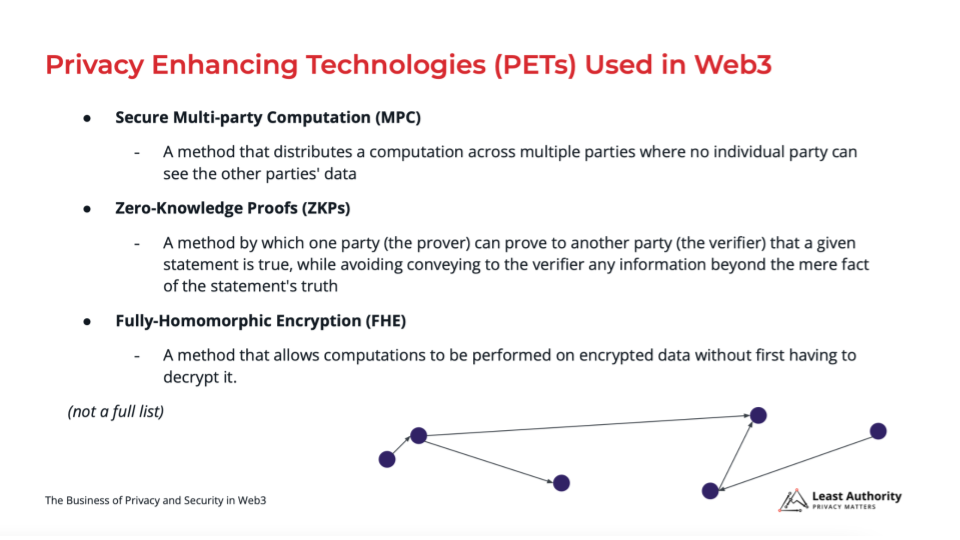Through our work, we have the opportunity to speak with various people in the FinTech, Cybersecurity, and Web3 fields. Recently, one pattern emerged: there is increasing interest in advanced cryptography techniques and protocols, such as zero-knowledge proofs (ZKPs), secure Multi-Party Computation (MPC), and Fully-Homomorphic Encryption (FHE), which can improve users’ privacy, facilitate scalability, and enable new collaborative business models for many products and systems. Simultaneously, there is a movement to adopt the use of artificial intelligence (AI) and machine learning (ML) in many businesses for increased efficiency.
Last week, Liz, our CEO, presented at the 2023 Big Data & AI World in Singapore, where she shared insights on “The Business of Privacy and Security in Web3.” The graphic below is a slide taken from her presentation that provides an overview of these three terms and their definitions:

The potential impact of utilizing these advanced cryptographic techniques and protocols is becoming more broadly appreciated and applied in many fields due to the benefits to security, privacy, and scalability. Although Web3 products are pioneering implementations, Web2 (the previous generation of the internet) products are also seeing the value of new approaches to managing personal data within their systems. Beside Web3, technological advancements and adoption of artificial intelligence (AI) and machine learning (ML) are reshaping our business operations.
Currently, our team is experimenting with the use of AI and ML in our own individual work and team processes. So far, we’ve seen that AI, like the Generative Pre-trained Transformers (GPT) models, can create impactful efficiencies in our work. Experiencing the transformation of our own workflows is a welcome challenge for us as a team that enjoys working with the latest innovations in the IT field.
As a result of our experience and interests, we are enthusiastic about exploring more opportunities to apply our extensive knowledge of zero-knowledge proofs, multi-party computation, and capability-based security in the use of AI and ML systems. We believe there are significant possibilities to improve the privacy of personal data input into – and managed by – these systems. We also see the opportunity to both better secure the training data and improve the verifiability, and therefore reliability, of the output of these systems in an industry-adapted way. While the potential is immense, there is still an abundance of challenges to address before we have a fully realized future of privacy-preserving AI and ML products.
If you’d like to collaborate with us and explore how to better secure and improve privacy in AI and ML systems utilizing advanced cryptography and privacy-enhancing technologies, please reach out to us at contactus@leastauthority.com.
